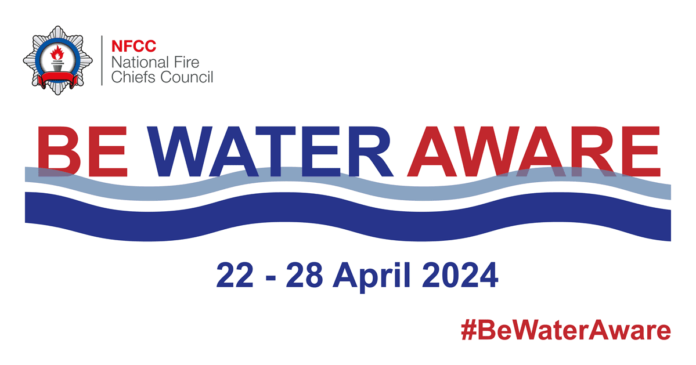This week sees the launch of the National Fire Chiefs Council’s #BeWaterAware Campaign.
In 2022, 266 lives were lost to accidental drowning in the UK. These deaths are preventable tragedies, Mid and West Wales Fire and Rescue Service is joining the call for people to stay safe in and around water.
The National Fire Chiefs Council’s (NFCC’s) #BeWaterAware campaign runs from 22nd – 28th April. Its aim is to raise awareness about the risk of accidental drowning and providing safety advice ahead of the warmer months.
Statistics reveal 40% of people who accidentally drowned had no intention of entering the water. Slips, trips, and falls were often the cause of these accidents.
Many people also underestimate the dangers of jumping into water or taking a dip to cool off especially those with limited experience of outdoor swimming. Unseen hazards and cold-water shock can mean even strong swimmers get into trouble.
Males account for 87% of these accidental fatalities, 60% of which are in inland waters such as rivers, reservoirs, and lakes.
Richie Felton, Head of Community Safety for Mid and West Wales Fire and Rescue Service said:
“It is particularly poignant to learn that 40% of people who drown each year had no intention of going into the water and were undertaking everyday activities such as running or walking near water hazards. It’s important to be aware of the risks and be prepared in case you do accidently end up in the water. By highlighting this issue and providing some simple safety messages we hope to reduce the number of these needless and preventable deaths.”
Simple tips to help stay safe include:
- If you are going for a walk or run near water stick to proper pathways and stay clear of the water’s edge.
- Don’t enter the water after drinking alcohol.
- Walk a safe route home after drinking, with friends and away from water.
- Make sure conditions are safe, avoid walking or running near water in the dark, if the surface is slippery or in bad weather.
- Never enter the water to try and help a person or animal – always call 999 and use any water rescue equipment if it is available.
- If you are spending time near water – whether at home or abroad make sure you are familiar with local safety information and children are fully supervised.
As the statistics show, may people don’t expect their time near water to turn into an emergency, so knowing what to do if you or someone else is in trouble in the water is lifesaving advice.
If someone is in trouble in the water, the best way to help is by staying calm, staying on land, and remember Call, Tell, Throw:
- Call 999 for the emergency services.
- Tell the struggling person to float on their back.
- Throw them something that floats.
If you find yourself in trouble in the water, remember to ‘Float to Live’. Tilt your head back with your ears submerged. Relax and breathe normally. Move your hands to help stay afloat. Spread your arms and legs out. Once your breathing is controlled, call for help or swim to safety.
Dawn Whittaker, Drowning Prevention Lead for NFCC said:
“Be Water Aware is about helping people spend time in and around water safely. “We encourage people to reduce their risk of drowning by making safe choices around water and to know what to do if an emergency should happen.
“Simple advice to ‘Call, tell, throw’ and ‘Float to Live’ are lifesaving messages which fire services share to help reduce these preventable deaths and the devastating impact they have on families and communities.”
For more information on #BeWaterAware campaign please visit: www.nfcc.org.uk/bewateraware
For safety messages, information, advice, or guidance during on Water Safety, please check out our Social Media channels and visit our website.
Help keep news FREE for our readers
Supporting your local community newspaper/online news outlet is crucial now more than ever. If you believe in independent journalism, then consider making a valuable contribution by making a one-time or monthly donation. We operate in rural areas where providing unbiased news can be challenging. Read More About Supporting The West Wales Chronicle
























